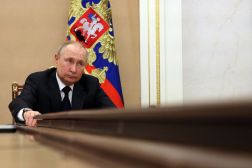Germany sees Russian efforts to hack its election, society

Russian forces are already conducting a campaign of hybrid cyber-warfare ahead of the German federal elections next year, in an effort to confuse the populace and destabilize the government, Berlin’s top domestic intelligence official warned.
“We are seeing increasingly aggressive cyber espionage and cyber operations targeting German government officials, members of parliament and employees of democratic parties,” Hans-Georg Maassen, head of Berlin’s domestic intelligence agency, the BfV said in a statement Thursday.
“Propaganda and disinformation, cyber attacks, cyber espionage and cyber sabotage are all part of the hybrid threat to Western democracies” from Russian intelligence agencies, Maassen added.
A “wide-range” of front organizations and “enormous” financial resources were being deployed, he said, blaming the attacks on a group of hackers variously referred to as APT 28 or “Fancy Bear.” The group, which is one of those that successfully attacked the computer network of the Democratic National Committee and dumped embarrassing emails online, is associated with Russia’s military intelligence agency the GRU.
“We expect a further increase in cyber attacks in the run-up to the elections,” Maassen concluded.
The announcement came the same day as a similar warning by the head of Britain’s foreign intelligence service, known as MI6, in a major — and very rare — public speech.
According to a British media report Alex Younger said — without naming Russia — that “cyberattacks, propaganda or subversion of democratic process” were now a “profound” to threat to democratic values.
Several recent studies by private sector analysts have examined the influence on the U.S. election of fake news stories — purveyed by sites with little regard for any journalistic standards and often based offshore. One report found that they were shared more frequently on social media networks than stories from reputable outlets. On Friday, the White House said President Obama had ordered a comprehensive review of past cyberattacks against U.S. presidential elections dating as far back as at least 2008.
“The connectivity that is at the heart of globalization can be exploited by states with hostile intent to further their aims deniably,” Younger said Thursday.
In Berlin, Maassen echoed those concerns in more pointed fashion. He called the revolution in information brought about by social networks “an ideal gateway for targeted disinformation. We are concerned that echo chambers are emerging [in the social media landscape] that make the formation of domestic political opinions highly vulnerable to automated opinion-shaping” by armies of bot accounts Maassen warned.
He said German officials had noted “a blatant surge of spear phishing attacks” aimed at political party officials and members of the German parliament or Bundestag. And he warned that data stolen from such attacks could be dumped online “to discredit German politicians.”
The objectives of the cyber hybrid campaign were twofold, BfV said: “To strengthen extremist groupings and parties,” and to create “uncertainty in German society as well as weakening or destabilizing the Federal Republic.”






